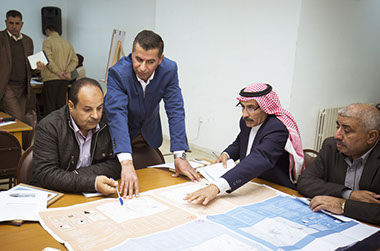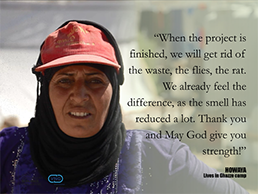Annual Update 2018 VNG International

‘The two vacuum trucks granted by
the Dutch Government through the LOGOReP Programme to Jordan, helped solve 90% of the sewage problems in the northern region of Jordan.’
Iyad Qassir
Water Authority of Jordan

‘It is so rewarding to be involved in the training for Young Talented Civil Servants. It is about leadership, creative thinking and networking. Soft skills, that in addition to their talents, energy and technical knowledge, will help them become the change makers for the future of Lebanon.’
Jarik Stollenga
Project Manager VNG International
Dealing with Conflict, Fragility
and Migration by strengthening
local government
Featured Project
Jordan and Lebanon,
Local Government Resilience Programme
(LOGOREP)
> In the context of the large numbers of Syrian refugees in the neighbouring countries, LOGOREP’s overall objective is to strengthen resilience at local government level in order to improve living conditions of the local population and refugees in host communities and refugee settlements. Its purpose is to maintain service delivery levels and enable longer-term planning for spatial and economic development, in the context of increased urbanization and pressure on resources.
Results relating to maintained service delivery:
- A low-cost low-tech system for waste separation, collection and treatment successfully introduced in 8 border municipalities in Lebanon: 75% less non-recyclable waste, so 75% less burning in the open air and 75% less soil pollution in a region of 100,000 people. Scalable and based on cooperation between the citizens and local governments;
- Improved quality of public spaces in two Lebanese municipalities and in the Zaa’tari camp in Jordan. With the active involvement of the population to make sure that the spaces meet their needs. In Lebanon this has contributed to better understanding between the original population and Syrian refugees. In Zaa’tari, the pilots are part of a broader spatial development framework for the further development of the camp. See https://www.logorep.nl/projects/urban-planning-project-building-social-integration-through-improved-pleasant-places/ and https://www.logorep.nl/projects/development-of-public-space-in-camp/ A handbook was developed to help apply the approach for other locations.
- In the Mafraq region, surrounding Zaa’tari in Jordan, the provision of two vacuum trucks, safety equipment, specialised equipment for sewer maintenance, and on-the-job training on sewer cleaning, led to large improvements of the current sewer system performance, reducing the necessity of high investment costs and increasing the safety of employees working in sewers. See https://www.logorep.nl/projects/
- Other realized plans for Zaa’tari: a slow traffic route or Health Loop for pedestrians and cyclists; a shady and green central park; upgrading the camp’s Souk – including food courts and plazas where women and children can relax and chat.
Results relating to developed capacities:
- An overarching result is that new approaches and models related to humanitarian response to conflicts have been introduced to UNHCR, UNDP, national and local authorities, linking relief interventions with long term development in the region;
- In Lebanon, a group of Young Talented Civil Servants were trained, which has led to concrete follow-up actions. One example: after the training a female civil servant set up a broadly accepted City Marketing Strategy and Plan, which she could then implement with the municipality’s own resources;
- Important steps have been made towards the creation of a good governance training institute in Jordan. Training of Trainers courses accomplished on Decentralisation, on Citizen Participation and on Local Economic Development. Two training modules on Citizen Participation and Local Economic Development for the newly elected local and municipal council members were developed. See: https://www.logorep.nl/projects/decentralisation-and-governance-support/
- Toolkits for municipalities are available on scenario planning for resilience, and innovating the public space.